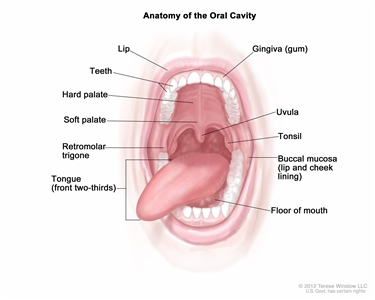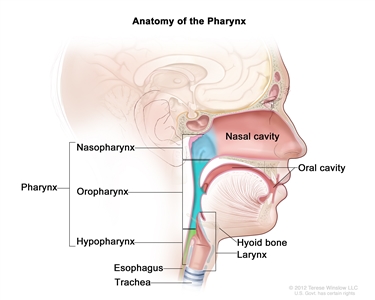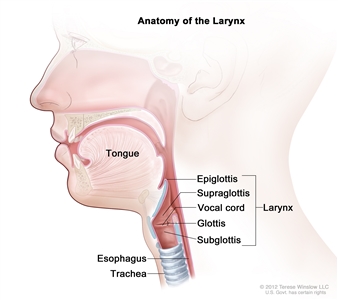Oral Cavity, Oropharyngeal, Hypopharyngeal, and Laryngeal Cancers Prevention
Avoiding risk factors and increasing protective factors may help prevent cancer.
Avoiding cancer risk factors may help prevent certain cancers. Risk factors include smoking, having overweight, and not getting enough exercise. Increasing protective factors such as quitting smoking and exercising may also help prevent some cancers. Talk to your doctor or other health care professional about how you might lower your risk of cancer.
Oral cavity, oropharyngeal, hypopharyngeal, and laryngeal cancers have common risk factors.
The following are risk factors for oral cavity, oropharyngeal, hypopharyngeal, and laryngeal cancers:
Tobacco use
Using tobacco is the most common cause of oral cavity, oropharyngeal, hypopharyngeal, and laryngeal cancers. The risk of these cancers is about 5 to 10 times higher for current smokers than for people who have never smoked, and is linked to how much and how long the person has smoked.
The use of all types of tobacco, including cigarettes, pipes, cigars, and smokeless tobacco (snuff and chewing tobacco) can cause cancers of the oral cavity, oropharynx, hypopharynx, and larynx.
Alcohol use
Using alcohol is also an important risk factor for oral cavity, oropharyngeal, hypopharyngeal, and laryngeal cancers.
The risk of oral cavity, oropharyngeal, hypopharyngeal, and laryngeal cancers increases with the number of alcoholic drinks consumed per day. The risk of these cancers is 2 to 6 times higher in people who have 2 or more alcoholic drinks per day compared with those who don't drink alcohol.
Tobacco and alcohol use
The risk of oral cavity, oropharyngeal, hypopharyngeal, and laryngeal cancers is higher in people who use both tobacco and alcohol than it is in people who use only tobacco or only alcohol. The risk of oral cavity cancer and oropharyngeal cancer is about 5 to 14 times higher in people who both smoke and drink heavily than it is in people who never smoke cigarettes or consume alcohol.
Betel quid chewing
Chewing betel quid alone or with added tobacco has been shown to increase the risk of oral cavity, oropharyngeal, hypopharyngeal, and laryngeal cancers. Betel quid contains areca nut, which is a cancer-causing substance. The risk of these cancers increases with how long and how often betel quid is chewed. The risk is higher when chewing betel quid with tobacco than when chewing betel quid alone. Betel quid chewing is common in many countries in South Asia and Southeast Asia, including China and India.
Personal history of head and neck cancer
A personal history of head and neck cancer increases the risk of oral cavity, oropharyngeal, hypopharyngeal, and laryngeal cancers.
The following is a risk factor for oral cavity cancer and oropharyngeal cancer:
Human papillomavirus (HPV) infection
Being infected with certain types of human papillomavirus (HPV), especially HPV-16, increases the risk of oropharyngeal cancers. HPV infection may also increase the risk of some oral cavity cancers. HPV infection is spread mainly through sexual contact.
The risk of oropharyngeal cancer is about 15 times higher in people who have oral HPV-16 infection compared with people who do not have oral HPV-16 infection.
The following is a protective factor for oral cavity, oropharyngeal, hypopharyngeal, and laryngeal cancers:
Quitting smoking
Studies have shown that when people stop smoking cigarettes, their risk of oral cavity, oropharyngeal, hypopharyngeal, and laryngeal cancers decreases by one half (50%) within 5 to 9 years. Within 20 years of quitting, their risk of these cancers is the same as for a person who never smoked cigarettes.
It is not clear whether avoiding certain risk factors will decrease the risk of oral cavity, oropharyngeal, hypopharyngeal, and laryngeal cancers.
Some studies show that when people stop drinking alcohol, their risk of oral cavity and laryngeal cancers decreases within about 20 years.
Getting an HPV vaccination greatly lessens the risk of oral HPV infection. It is not yet known whether getting an HPV vaccination at any age will decrease the risk of oropharyngeal cancer from HPV infection. For information about the use of HPV vaccination to prevent cervical cancer, see Cervical Cancer Causes, Risk Factors, and PreventionCervical Cancer Causes, Risk Factors, and Prevention.
Cancer prevention clinical trials are used to study ways to prevent cancer.
Cancer prevention clinical trials are used to study ways to lower the risk of certain types of cancer. Some cancer prevention trials are done with healthy people who have not had cancer but who have an increased risk for cancer. Other prevention trials are done with people who have had cancer and are trying to prevent another cancer of the same type or to lower their chance of developing a new type of cancer. Other trials are done with healthy volunteers who are not known to have any risk factors for cancer.
The purpose of some cancer prevention clinical trials is to find out whether actions people take can prevent cancer. These may include eating fruits and vegetables, exercising, quitting smoking, or taking certain medicines, vitamins, minerals, or food supplements.
New ways to prevent oral cavity, oropharyngeal, hypopharyngeal, and laryngeal cancers are being studied in clinical trials.
Information about clinical trials supported by NCI can be found on NCI's clinical trials searchclinical trials search webpage. Clinical trials supported by other organizations can be found on the ClinicalTrials.govClinicalTrials.gov website.


